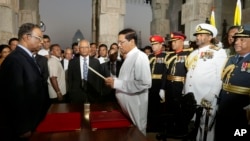Maithripala Sirisena was sworn in as Sri Lanka’s new president after he inflicted a shocking defeat on the country’s former powerful leader, Mahinda Rajapaksa. He now faces the challenge of fulfilling pledges of political and social transformation.
Sirisena took the oath of office Friday evening at the Independence Square in Colombo, hours after the Election Commission announced that he had polled 51.28 percent of the vote.
The upset victory swept Rajapaksa out of office after 10 years at the helm of the island nation. After conceding defeat in the early morning, he vacated the official residence and promised a smooth transition.
Emotions ranged from shock and surprise at the ouster of Rajapaksa, to relief to those who had rooted for change. Sounds of celebration reverberated in the capital, Colombo, as Sirisena's supporters set off firecrackers.
Political analysts say minority groups played a key role in ending the decade-long rule of the once-powerful leader.
Like Rajapaksa, Sirisena represents the country’s Sinhala majority. But it is support from Tamil and Muslim minorities which helped nail down the narrow victory.
Jehan Perera, head of Colombo’s National Peace Council, said Sirisena’s victory demonstrates an ethnic polarization in the country.
“What has defeated him [Rajapaksa] is the fact that the ethnic minority vote turned totally against him,” said Perera. "But the President did retain the majority support of the Sinhalese. So what it shows is that the president’s period of governance alienated the minority vote."
The 63-year-old Sirisena, who had quit Rajapaksa’s government to challenge him when early elections were called, is a complete contrast to his predecessor. Unlike Rajapaksa’s larger-than-life image, he is a low profile, down-to-earth politician who comes from the country’s farming heartland.
Just weeks ago, Sirisena’s victory seemed not just improbable, but impossible as he pitted himself against a leader who had a stranglehold on power.
The head of the Center for Policy Alternatives in Colombo, Paikiasothy Saravanamuttu, says Sirisena is expected to move the country toward greater democracy, accountability and transparency.
“The Mahinda Rajapaksa regime and the executive presidency, they had a personality which was autocratic and office which was also authoritarian," he said. "Together they posed a challenge to democratic governance. We now have a chance of changing that and returning us to our democratic morals.”
The new president’s challenge will be to fulfill pledges of ushering in political and social transformation. He says he will end a culture of nepotism and corruption which prevailed under Rajapaksa, who had packed the government with his family members. He has also promised to ensure religious harmony.
Rajapaksa's ouster
Sri Lankans turned up in large numbers to vote Thursday as Rajapaksa sought a third term in office and delivered a result no one had forecast when he called early elections.
Rajapaksa, who won the 2010 elections, rode a wave of popularity after crushing Tamil Tiger rebels. But his popularity plummeted in recent years as he faced a rising tide of criticism for becoming authoritarian, putting his family in top government positions and undermining institutions such as the judiciary.
He also faced allegations of corruption and doing little to draw the ethnic Tamil community into the mainstream.
Sirisena has promised to reduce the immense powers that Rajapaksa had concentrated in his hands and hold fresh parliamentary elections within 100 days.
An opposition lawmaker said transitional arrangements are being discussed with Rajapaksa, who has been guaranteed security. Some had feared that the country might experience turmoil if the president is defeated.
But Perera said those fears have proved unwarranted.
“There was a concern that the president might not wish to leave and that he could even resort to the military, because the military is under the control of his brother," said Perea. "But this did not happen. He respected the vote of the people, he respected the mandate, which is to his credit.”
The election results are also being watched closely in India, where some analysts had voiced concerns that Sri Lanka under Rajapaksa had been moving to build close relations with New Delhi’s rival, China.
Sirisena’s campaign pledges of rebalancing the country’s foreign policy will also be watched closely by India and Western countries.
Rajapaksa had tilted toward China as he sought to deflect international criticism of his human rights record. Sirisena has said he wants equal relations with countries like India, China, Pakistan and Japan.
Sirisena’s supporters have said they will review all major infrastructure projects, most of which are being built with Chinese investment.




